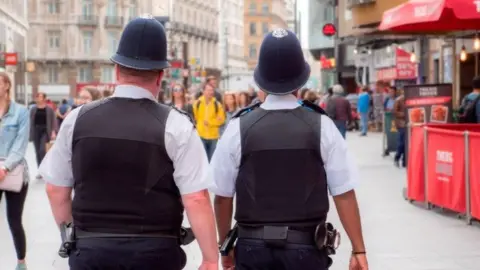Give me more power to sack officers - Met chief
Met Police Commissioner Sir Mark Rowley said it is "nonsensical" he does not have the power to sack staff.
He warned the force has "hundreds of people who shouldn't be here", as cases of officers previously accused of violence against women are re-examined.
Sir Mark said dozens of officers have been redeployed from tackling serious crime and terrorism to investigate wrongdoing in the force.
A BBC London poll found deep distrust in the Met following a damning report.
Baroness Casey uncovered widespread racism, homophobia and misogyny in the force, and warned it may need to be broken up if it can not be urgently reformed.
During a phone-in on BBC Radio London on Friday in which he answered listeners' concerns about the force, Sir Mark criticised the Met's disciplinary process and called for an overhaul.
"In all cases, I don't have the final say on who's in the Metropolitan Police. I know that sounds mad, I'm the commissioner," he said.
He pointed out that independent legal tribunals can decide the Met has to retain officers even though the force wants to sack them.
In a letter to the Mayor of London and Home Secretary Suella Braverman, Sir Mark said officers had been diverted to the force's Directorate of Professional Standards (DPS).
"Over the last three months we have had, on average, 90 additional officers and staff from these areas supporting DPS," he wrote, adding that many had volunteered.
Sir Mark said four in five of the original inquiries into officers accused of domestic and sexual violence in the last decade had not resulted in the correct action and should be reassessed.
 Getty Images
Getty ImagesThe Met began rechecking staff accused of domestic abuse and sexual violence in the 10 years to April 2022 following the conviction of David Carrick, a Met officer who carried out a series of rapes during his career.
Of 1,131 individuals reinvestigated:
- 246 will face no formal action because correct action was taken at the time
- 689 will undergo a new assessment to pursue new or missed lines of inquiry, including possibly talking again to victims and witnesses
- 196 face formal risk management measures and potentially a review to determine if they should remain in the force
All of these cases will be reassessed by an independent panel of experts.
Sir Mark told the BBC that vetting rules in recruiting staff have been tightened, and in the next six months about 100 officers will have their status reviewed and "may well end up leaving the organisation".
"We have hundreds of people who shouldn't be here and the tens of thousands of good men and women here are as embarrassed and angered by that as anybody, and they're helping us sort them out," he added.
During the BBC phone-in, Sir Mark admitted the number of neighbourhood police officers had fallen by 1,600, telling a caller that he intended to "stabilise" that figure to improve safety in the capital.
He told another caller that the Met needs to be more "proactive" on investigating rape after reports almost quadrupled in a decade, describing it as a "massive issue" for the force.
Other measures designed to clean up the Met include checking the records of all of the Met's 50,000 employees against the Police National Database, an exercise which is being carried out by forces nationally.
The 10,000 checked so far reveal 38 potential cases of misconduct and 55 cases of off-duty association with a criminal.
Sir Mark has previously said he was considering banning anyone with convictions, other than the most minor, from the force.
He has also said he has the backing of the prime minister and home secretary over greater powers to sack officers, and hopes a review of the rules can be concluded swiftly.
Sir Mark told BBC Radio 4's Today programme the current policy on accepting staff was "too permissive" and left "too much ground for interpretation".
He added "complex" police regulations mean some officers under investigation have already been sacked by the Met, but were then reinstated by an independent lawyer.
A poll commissioned by BBC London found public confidence in the Met Police has been shattered after high profile cases like the murder of Sarah Everard.
Out of more than 1,000 people surveyed, almost half of female respondents surveyed said they "totally distrusted" the Met following numerous controversies involving some of its officers.
Sir Mark's letter to the mayor of London and home secretary also reveals 161 Met officers have criminal convictions. Of these:
- 76 are for serious traffic offences such as drink-driving
- 49 are for dishonesty or violence.
- eight committed the offences as police officers and are still with the force
- three have convictions for sexual offences
The Chairman of London's Police and Crime Committee Susan Hall told the BBC that Sir Mark's findings showed that "things are going to get much worse before they get better".
London Mayor Sadiq Khan said: "One of the problems with the police is it's easy to join but it's difficult to get rid of bad police officers, and that's why it's incredibly important if we're going to change the culture….we've got to do this hard work."
